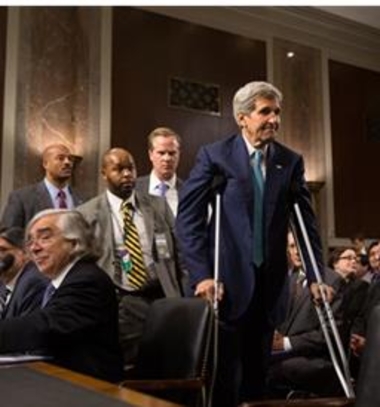Kerry pushes back against critics of Iran deal

Washington (AP) — Secretary of State John Kerry bluntly challenged critics of the Obama administration's nuclear deal with Iran on Thursday, calling it "fantasy, plain and simple," to think the United States failed to hold out for a better deal at the bargaining table.
"Let me underscore, the alternative to the deal we've reached isn't what we're seeing ads for on TV," he said at the first public hearing on the controversial deal to lift economic and other sanctions in exchange for concessions of the Islamic state's nuclear program. He was referring commercials aired by the American Israel Public Affairs Committee urging lawmakers to reject the deal.
"It isn't a better deal, some sort of unicorn arrangement involving Iran's complete capitulation," Kerry told the Senate Foreign Relations Committee.
He spoke as Sen. Bob Corker of Tennessee and other Republicans spoke scornfully of the administration's claim that the only alternative to the deal that was reached was a war with Iran.
"You've been fleeced," Corker, the committee chairman, said as Kerry sat nearby at the witness table — although he later sought to soften his criticism by saying, "we've been fleeced." He said he was depressed after hearing the secretary of state and other administration officials make the same claim Wednesday in a closed-door briefing for lawmakers.
"You guys have been bamboozled," added Sen. Jim Risch, R-Idaho, who said the agreement wouldn't permit testing at Iran's Parchin military complex.
Kerry was joined by Energy Secretary Ernest Moniz, who sat across the table from Iranian negotiators in the talks, and Treasury Secretary Jack Lew, whose agency enforces many of the sanctions that have squeezed Iran's economy in recent years as part of a strategy to force Tehran to the bargaining table.
The hearing marked a new phase of a bruising struggle that will lead to what will arguably be the biggest foreign policy vote in more than a decade.
The deal will take effect unless Congress blocks it, and Republicans in control of the House and Senate have made clear they intend to try to do so in September.
Obama has vowed to veto any such bill. That would lead to a vote to override his veto, and the administration is searching for 34 votes in the Senate or 146 in the House, enough to assure the veto sticks.
Democrats and allied independents control 46 seats in the Senate.
The hearing unfolded as Senate Majority Leader Mitch McConnell, R-Ky., demanded the administration immediately turn over the text of side agreements between Iran and the International Atomic Energy Agency. "The law is clear," he said in remarks on the Senate floor.
Administration officials say that in the past, such agreements have not been made available. They also say U.S. officials are available to provide information about them in classified meetings.
The committee hearing turned contentious at times, particularly including when Sen. Bob Menendez, D-N.J., asked Kerry a tough question — and Corker interjected an answer. "You want to answer, senator?" Kerry said tartly to the chairman, who had said that Iran would be allowed to develop ballistic missiles.
Moniz also sought to parry Republican charges, including the claim that Kerry had failed to achieve a goal of assuring inspections "anywhere, anytime" to see if Iran is cheating on the deal.
"Like Secretary Kerry, I did say the words 'anytime, anywhere,' and I am very pleased that yesterday a member of your caucus acknowledged, however, that the full sentence was "anytime, anywhere in the sense of a well-defined process with a well-defined end time."
In his testimony, Kerry read aloud from statements by past Israeli intelligence officials who praised the agreement, and said he expects Saudi Arabia will ultimately back the deal.
Israeli prime minister Benjamin Netanyahu has been an outspoken critic of the agreement, saying it would set Iran, which denies his country's right to exist, on a path toward obtaining a nuclear weapon.
Kerry said that when the negotiations began, experts calculated that it would take Iran only two to three months to produce enough material for a bomb, the so-called breakout time.
"If the deal is rejected, we return immediately to this reality, except that the diplomatic support we have been steadily accumulating in recent years would disappear overnight," he said.
The United Nations Security Council has already voted to lift the international sanctions in place, effectively accepting the deal that the United States and other powers have struck with Iran. As a result, administration officials say the United States would be left trying to enforce more limited sanctions, without the support of other nations that backed the earlier steps.
"President Obama has made it crystal clear we will never accept a nuclear-armed Iran," Kerry said. "He is the only president who has developed a weapon capable of guaranteeing that. And he has not only developed it, he has deployed it."
That appeared to be a reference to a bunker buster bomb, the "Massive Ordnance Penetrator."
By Deb Riechmann and David Espo, Associated Press. Copyright 2015 The Associated Press. All rights reserved. This material may not be published, broadcast, rewritten or redistributed.
The Gayly – July 23, 2015 @ 12:30pm.





